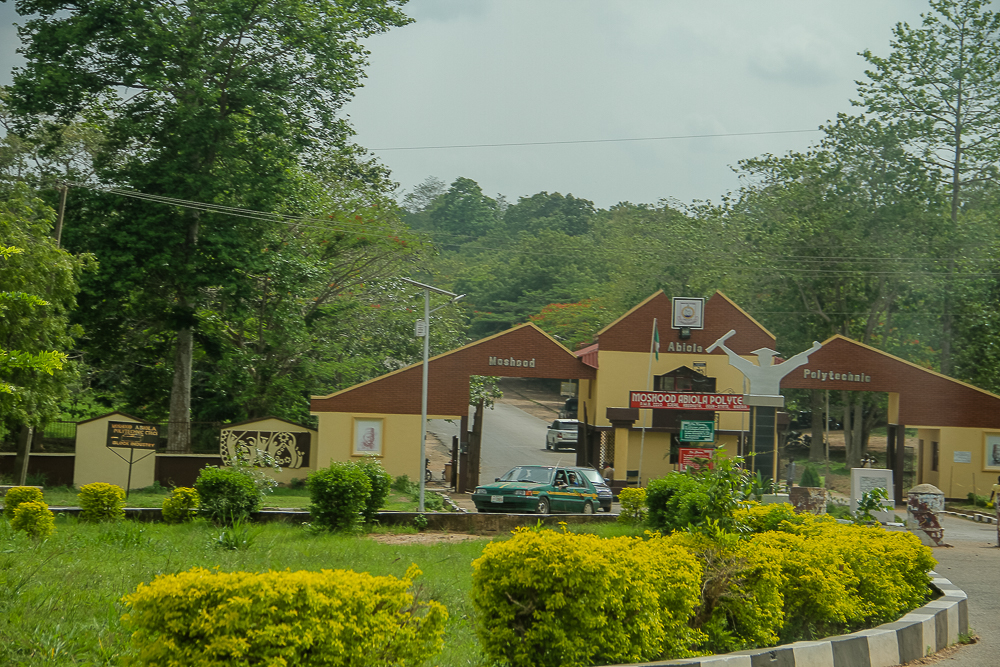|
Ade Tuyo
Joshua Ade Tuyo was a prominent Nigerian businessman from Ijebu-Ode, Ogun State. Life He was born into the family of an Ijebu farmer and indigo trader. Originally trained as a teacher, he left the teaching profession for office work. He spent two dozen years as a clerical staff for the Nigerian Railway Corporation, the British Bank of West Africa and the ministry of Commerce, and retired in 1953. During his clerical years, he married an Ijebu woman who was born into a trading family in Onitsha. His wife took to trading while Ade was familiarizing himself with office work, as this was the dominant gender course taken by many Nigerian households during the pre-colonial and early colonial period. In late 1949, Mrs Ade Tuyo lost most of her trading goods in a robbery operation. Desiring to go into a much more secure business, she entered a training course for bakery. After Mr Ade Tuyo retired, he sensed the potential in the bakery business. This intuition was partly fostered by the ... [...More Info...] [...Related Items...] OR: [Wikipedia] [Google] [Baidu] |
Nigeria
Nigeria ( ), , ig, Naìjíríyà, yo, Nàìjíríà, pcm, Naijá , ff, Naajeeriya, kcg, Naijeriya officially the Federal Republic of Nigeria, is a country in West Africa. It is situated between the Sahel to the north and the Gulf of Guinea to the south in the Atlantic Ocean. It covers an area of , and with a population of over 225 million, it is the most populous country in Africa, and the world's sixth-most populous country. Nigeria borders Niger in the north, Chad in the northeast, Cameroon in the east, and Benin in the west. Nigeria is a federal republic comprising of 36 states and the Federal Capital Territory, where the capital, Abuja, is located. The largest city in Nigeria is Lagos, one of the largest metropolitan areas in the world and the second-largest in Africa. Nigeria has been home to several indigenous pre-colonial states and kingdoms since the second millennium BC, with the Nok civilization in the 15th century BC, marking the first ... [...More Info...] [...Related Items...] OR: [Wikipedia] [Google] [Baidu] |
Nigerian Railway Corporation
Nigerian Railway Corporation (commonly abbreviated as NRC) is the state-owned enterprise with exclusive rights to operate railways in Nigeria. History and legislative background The Nigerian Railway Corporation traces its history to the year 1898, when the first railroad in Nigeria was constructed by the British colonial government. On October 3, 1912, the Lagos Government Railway and the Baro-Kano Railway were amalgamated,Stocker, JohnNigerian Railway Jubilee, 1901-1951: An Illustrated and Descriptive History of the Nigerian Railway (Lagos Railway, Wushishi Tramway, Baro Kano Railway) 1951. Retrieved November 12, 2013. starting nationwide rail service under the name Government Department of Railways. With the passing of the Nigerian Railway Corporation Act of 1955, the company gained its current name as well as the exclusive legal right to construct and operate rail service in Nigeria. The rail network reached its maximum extent shortly after Nigerian independence, in 1964. ... [...More Info...] [...Related Items...] OR: [Wikipedia] [Google] [Baidu] |
Nigerian
Nigerians or the Nigerian people are citizens of Nigeria or people with ancestry from Nigeria. The name Nigeria was taken from the Niger River running through the country. This name was allegedly coined in the late 19th century by British journalist Flora Shaw, who later married Baron Frederick Lugard, a British colonial administrator. ''Nigeria'' is composed of various ethnic groups and Culture, cultures and the term Nigerian refers to a citizenship-based civic nationality. Nigerians derive from over 250 ethnic groups and languages.Toyin Falola. ''Culture and Customs of Nigeria''. Westport, Connecticut, USA: Greenwood Press, 2001. p. 4. Though there are multiple ethnic groups in Nigeria, economic factors result in significant mobility of Nigerians of multiple ethnic and religious backgrounds to reside in territories in Nigeria that are outside their ethnic or religious background, resulting in the mixing of the various ethnic and religious groups, especially in Nigeria's cities ... [...More Info...] [...Related Items...] OR: [Wikipedia] [Google] [Baidu] |
Ijebu-Ode
Ijebu-Ode is a town in Ogun State, Nigeria, South Western geopolitical zone in Nigeria, close to the A121 highway (Nigeria), A121 highway. The city is located 110 km by road north-east of Lagos; it is within of the Atlantic Ocean in the eastern part of Ogun State and possesses a warm tropical climate. According to the ''Britannica'', by the 16th century it was established as the chief town, and since pre-colonial times it has been the capital of the Ijebu Kingdom, Ijebu kingdom. It has an estimated population of 222,653 (2006 census). It is home to Sungbo's Eredo one of the largest ramparts in West Africa. As with most Ijebu people, Ijebus, people from Ijebu Ode have a nationwide reputation of being natural entrepreneurs, The primary cultural food is "Ikokore". History The largest city inhabited by the Ijebu people, Ijebus, a sub-group of the Yoruba people, Yoruba ethnic group who speak the Ijebu dialect of Yoruba, it is historically and culturally the headquarters of I ... [...More Info...] [...Related Items...] OR: [Wikipedia] [Google] [Baidu] |
Ogun State
Ogun State is a state in southwestern Nigeria. Created on 3 February 1976 from the former Western State. Ogun State borders Lagos State to the south, Oyo State and Osun State to the north, Ondo State to the east, and the Republic of Benin to the west. Abeokuta is both Ogun State's capital and most populous city; other important cities in the state include Ijebu Ode, the royal capital of the Ijebu Kingdom, and Sagamu, Nigeria's leading kola nut grower. Ogun state is covered predominantly by rain forest and has wooden savanna in the northwest . Ogun State had a total population of 3,751,140 residents as of 2006, making Ogun State the 16th most populated state in Nigeria In terms of landmass, Ogun State is the 24th largest State in Nigeria with land area of 16,762 kilometer square. Nicknamed the "Gateway to Nigeria", the state is notable for having a high concentration of industrial Estates and being a major manufacturing hub in Nigeria. Major factories in Ogun include the Dangote ... [...More Info...] [...Related Items...] OR: [Wikipedia] [Google] [Baidu] |
Indigo
Indigo is a deep color close to the color wheel blue (a primary color in the RGB color space), as well as to some variants of ultramarine, based on the ancient dye of the same name. The word "indigo" comes from the Latin word ''indicum'', meaning "Indian", as the dye was originally exported to Europe from India. It is traditionally regarded as a color in the visible spectrum, as well as one of the seven colors of the rainbow: the color between blue and violet; however, sources differ as to its actual position in the electromagnetic spectrum. The first known recorded use of indigo as a color name in English was in 1289. History ''Indigofera tinctoria'' and related species were cultivated in East Asia, Egypt, India, Bangladesh and Peru in antiquity. The earliest direct evidence for the use of indigo dates to around 4000 BC and comes from Huaca Prieta, in contemporary Peru. Pliny the Elder mentions India as the source of the dye after which it was named. It was importe ... [...More Info...] [...Related Items...] OR: [Wikipedia] [Google] [Baidu] |
People From Ogun State
A person ( : people) is a being that has certain capacities or attributes such as reason, morality, consciousness or self-consciousness, and being a part of a culturally established form of social relations such as kinship, ownership of property, or legal responsibility. The defining features of personhood and, consequently, what makes a person count as a person, differ widely among cultures and contexts. In addition to the question of personhood, of what makes a being count as a person to begin with, there are further questions about personal identity and self: both about what makes any particular person that particular person instead of another, and about what makes a person at one time the same person as they were or will be at another time despite any intervening changes. The plural form "people" is often used to refer to an entire nation or ethnic group (as in "a people"), and this was the original meaning of the word; it subsequently acquired its use as a plural form of per ... [...More Info...] [...Related Items...] OR: [Wikipedia] [Google] [Baidu] |
Yoruba Businesspeople
The Yoruba people (, , ) are a West African ethnic group that mainly inhabit parts of Nigeria, Benin, and Togo. The areas of these countries primarily inhabited by Yoruba are often collectively referred to as Yorubaland. The Yoruba constitute more than 42 million people in Africa, are a few hundred thousand outside the continent, and bear further representation among members of the African diaspora. The vast majority of the Yoruba population is today within the country of Nigeria, where they make up 21% of the country's population according to CIA estimations, making them one of the largest List of ethnic groups of Africa, ethnic groups in Africa. Most Yoruba people speak the Yoruba language, which is the Niger–Congo languages, Niger-Congo language with the largest number of native or L1 speakers. In Africa, the Yoruba are contiguous with the Yoruboid languages, Yoruboid Itsekiri to the south-east in the northwest Niger Delta, Bariba people, Bariba to the northwest in Benin a ... [...More Info...] [...Related Items...] OR: [Wikipedia] [Google] [Baidu] |
Year Of Birth Missing
A year or annus is the orbital period of a planetary body, for example, the Earth, moving in its orbit around the Sun. Due to the Earth's axial tilt, the course of a year sees the passing of the seasons, marked by change in weather, the hours of daylight, and, consequently, vegetation and soil fertility. In temperate and subpolar regions around the planet, four seasons are generally recognized: spring, summer, autumn and winter. In tropical and subtropical regions, several geographical sectors do not present defined seasons; but in the seasonal tropics, the annual wet and dry seasons are recognized and tracked. A calendar year is an approximation of the number of days of the Earth's orbital period, as counted in a given calendar. The Gregorian calendar, or modern calendar, presents its calendar year to be either a common year of 365 days or a leap year of 366 days, as do the Julian calendars. For the Gregorian calendar, the average length of the calendar year (the mea ... [...More Info...] [...Related Items...] OR: [Wikipedia] [Google] [Baidu] |
Year Of Death Missing
A year or annus is the orbital period of a planetary body, for example, the Earth, moving in its orbit around the Sun. Due to the Earth's axial tilt, the course of a year sees the passing of the seasons, marked by change in weather, the hours of daylight, and, consequently, vegetation and soil fertility. In temperate and subpolar regions around the planet, four seasons are generally recognized: spring, summer, autumn and winter. In tropical and subtropical regions, several geographical sectors do not present defined seasons; but in the seasonal tropics, the annual wet and dry seasons are recognized and tracked. A calendar year is an approximation of the number of days of the Earth's orbital period, as counted in a given calendar. The Gregorian calendar, or modern calendar, presents its calendar year to be either a common year of 365 days or a leap year of 366 days, as do the Julian calendars. For the Gregorian calendar, the average length of the calendar year (the me ... [...More Info...] [...Related Items...] OR: [Wikipedia] [Google] [Baidu] |




_1938.jpg)

